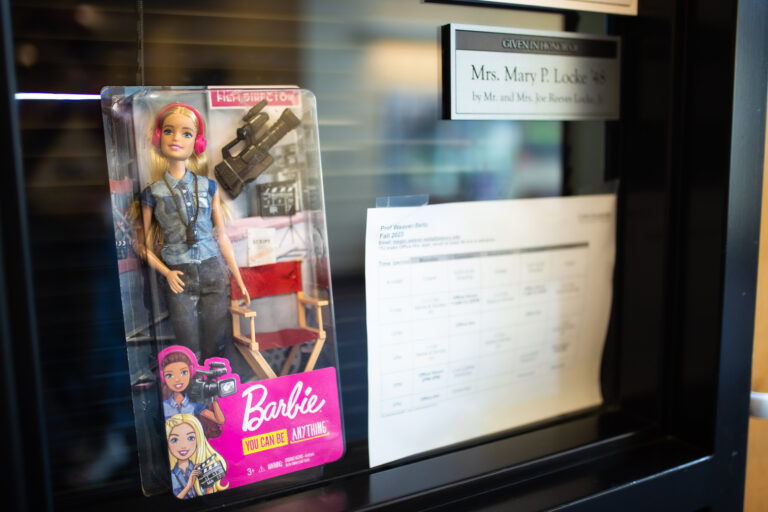This article will contain spoilers for Greta Gerwig’s “Barbie.” I will be talking in-depth about the plot and writing about serious topics while unironically using the phrases “Barbie Land” more than a few times – so enjoy. It’s okay to laugh a little.
Writer and director of “Lady Bird,” “Little Women,” and now “Barbie,” Greta Gerwig has been creating stories by women and for women since the beginning of her rise to public attention. But “Barbie” is different.
It is on the nose. It has very little subtlety. It is blunt – at times, angry. It is everything that a woman is told not to be. And that was the point.
I sat down with Asbury film Professor Megan Weaver-Seitz to talk about her experience with the movie as a woman with a career in film. She described to me what she called “markers” in her career, where she realized that progress was actually being made. She made a distinction with “Barbie,” saying, “Now we’re talking.” It was no longer the subvert messaging that women can be strong, or women don’t need men to save them, etc. Gerwig’s movie just said the hard things without holding back. “Finally,” Weaver-Seitz told me, “Someone said it on a big screen… everything I have felt and everything I have experienced.”
I was on the phone with my mom the other day, and she described the way she wanted to stand up and clap after America Ferrera’s monologue about the contradictions that come with being a woman. I remember my first thought being: Is this too on the nose? Could they have said this more subtly? This is when I had the realization that women have been saying these things subtly for years. It is time to be direct.
With the fact that “Barbie” was so blunt, naturally, there have been some extreme reactions, including that it is completely anti-men or ‘man-hating.’ This is a conversation I take seriously, as I think that man-hating feminism will undermine any progress we attempt to make with gender equality.
On a surface level, it is easy to see where the argument came from with certain aspects of the move. But Gerwig has never been content with leaving things on a surface level. She may have made a movie about a kids’ toy, but it makes us think like adults.
At the heart of many of the arguments about this movie’s negative depiction of men is the matriarchy of Barbie Land. People seem to think that the audience was meant to think Barbie Land is actually perfect. A little hint about the utopian genre: most of the time, the story tells you a utopia is perfect so that you can figure out that it is not perfect.
The treatment of the Kens doesn’t sit well with a lot of people (including me) – that’s because it wasn’t supposed to. Barbie Land points out that the inverse distribution of power is also not good. The most overlooked point of the whole movie is that Barbie chose to leave Barbie Land for the real world. Gerwig was never proposing the idea that this utopian matriarchy as a solution. In fact, it was the opposite – meaning that the treatment of Kens in Barbie Land was not in any way anti-men. Instead, it was pushing toward actual gender equality. Not inverse oppression.
People have also had major issues with Ken’s depiction overall. Gerwig has explained in multiple interviews that she designed the Kens and Barbies to be childish and a little spacey because they are dolls. It was not to make men appear as stupid. So, is it that specifically the men are portrayed as dumb in the film, or did it just stand out because we are more used to seeing women in ditsy roles than men?
How long has the “dumb blonde” trope existed in media? If all of Ken’s lines had been said by a woman, it would have just sounded like every single character Marilyn Monroe ever played.
Gerwig chose to make the ultimate moment of realization for Barbie happen alongside Ken. Barbie sits down and apologizes for the way that she treated him as less than and the way she made him feel. She tells him that he isn’t defined by his career, his relationship to her, or his competition with the men around him.
In the same interview with The Atlantic, the interviewer asked Gerwig about the men in “Barbie.” She began talking about the patriarchy, saying, “Obviously, these systems are terrible for men too.” She said how surprised she was to see the men on set cry during the big monologue because “they have their own speech they feel they can’t ever give… and they have their twin tightrope, which is also painful.” Gerwig recognizes the negative effects of our current way of doing things on men and carries that into her making of “Barbie.”
There is also another bottom line here. “Barbie” is not about men. Men do not have to like the movie. It is not written for them. It was written by women for women. We wouldn’t critique a kids movie for being “anti-adult” simply because adults were not the target audience.
“Not every movie was made for every person,” Weaver-Seitz tells me. So while men can dislike the movie, it doesn’t mean they have to berate its quality because they didn’t enjoy it. It isn’t about them.
While there are some underlying messages that contradict the idea that “Barbie” is anti-men, that is far from the point of the movie. In fact, yet again, the concern about its effect on the feelings of men has overtaken many of the valuable conversations about what this movie says about women.
This movie put words to an underlying experience that almost every woman I know has felt and buried deep. It was catharsis in its purest form, not subtle or hiding behind a surface-level meaning, but directly saying the things that hurt. And not just the surface-level feminism we hear all the time, but the messy contradictions of being a woman in the real world.
In my conversation with Weaver-Seitz, we got to the topic of her daughter – still very young – with favorite heroes like Rapunzel, Raya, and Moana. She went on to say, “I hope [my daughter] looks back at this movie and says that’s outdated.”
We dwelled on this idea for a while. We both loved the movie. It externalized the experience of womanhood in a way we haven’t experienced, and it made both of us feel so deeply. I pointed out that maybe the greatest hope we can have, though, is that her daughter would watch the movie and not fully understand it. She wouldn’t have those big feelings that we did because her experience as a woman would be vastly different than the ones that we have had.




